Koh Ewe
Tue, August 22, 2023
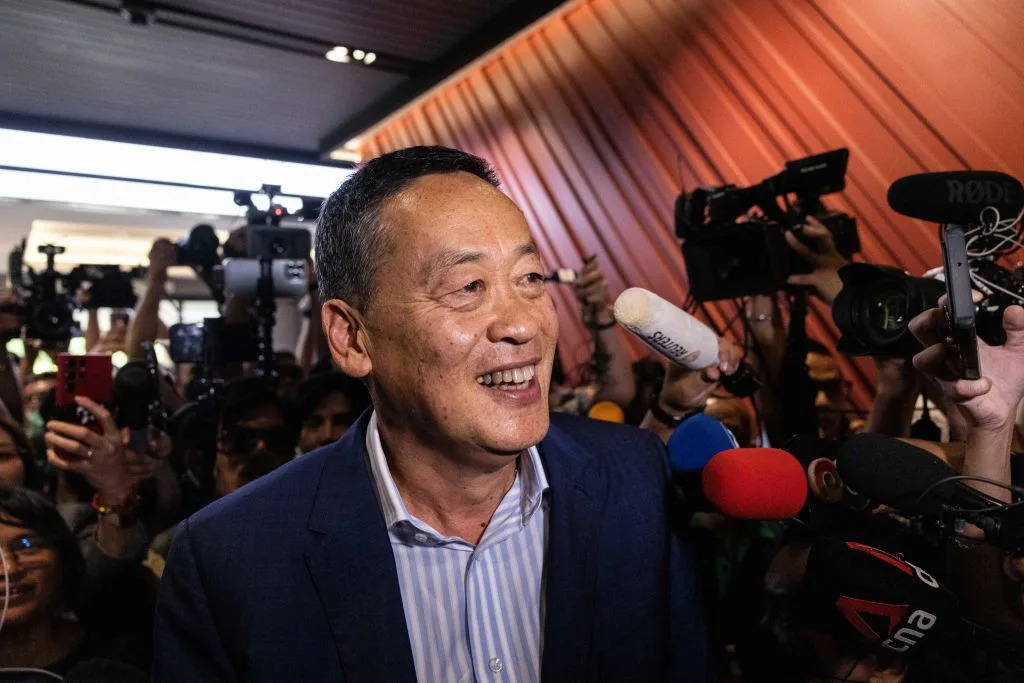
Srettha Thavisin speaks to media as he arrives at Pheu Thai's headquarters in Bangkok on August 22, 2023. Credit - Lauren DeCicca—Getty Images
Concluding months of uncertainty, Thailand is finally getting a new prime minister: 60-year-old Srettha Thavisin was backed by votes from 482 out of 747 lawmakers in parliament on Tuesday after his party Pheu Thai cobbled together a controversial coalition to form a new government.
Srettha—a Bangkok-based real estate tycoon who, standing at six-foot-three-inches, is nicknamed Nid (“little” in Thai)—is a relative newcomer to politics, holding strong support from businesses and known to be a vocal supporter of queer rights and environmental sustainability. (He is also facing allegations of tax evasion—which some lawmakers brought up at the parliamentary debate on Tuesday.)
But Srettha’s ascent marks less the start of a new era for Thai politics and more a last grasp at power by both the populist Pheu Thai party and the conservative establishment. When the country held its general election in May, the progressive, pro-democracy Move Forward Party came out on top, promising to turn the page from the military- and monarchy-aligned rule of the last decade. Initially, Pheu Thai, which finished second at the polls and had also opposed the military establishment that ousted its elected former leaders twice in coups, announced an alliance with Move Forward. However, when it eventually became clear that the establishment would block Move Forward from taking charge, Pheu Thai abandoned the alliance and joined forces with the military-aligned parties it had once forsworn.
“We will translate disagreements into consensus,” Pheu Thai wrote in a post on X, the platform previously known as Twitter, on Tuesday evening when it became clear that Srettha would become the country’s next Prime Minister.
That won’t be easy though, experts warn. Pheu Thai is set to take the helm of a precarious coalition government of former enemies, betraying much of its own base as well as earning the ire of a large and growing progressive movement. Here’s what to know about how Pheu Thai got to this point—and what it will have to grapple with going forward.
Moving forward without Move Forward
Going into May’s election, Pheu Thai was widely expected to perform best. Public dissatisfaction with the country’s tumultuous military-backed rule was clear, and Pheu Thai had long occupied the most prominent opposition role. Srettha was one of the party’s three prime ministerial candidates, which also included Paetongtarn Shinawatra, the daughter of former Prime Minister and de facto founder of Pheu Thai Thaksin Shinawatra, who returned from exile on Tuesday.
But the upstart Move Forward Party—led by the young and charismatic Pita Limjaroenrat and most known for its calls to amend Section 112, the controversial lese-majeste law wielded against pro-democracy activists—ended up getting even more votes. Pheu Thai did not back Move Forward’s royal defamation reform plan, but it partnered with the election winners anyway, united in their common promise to end the incumbent military-backed rule.
After Pita was blocked from becoming Prime Minister last month, Move Forward announced that it would support a Pheu Thai-led coalition, emphasizing that its goal was to “form a government of the democracy side.” But it had become clear that the royalist establishment forces that stood in Pita’s way would not permit any new government with Move Forward involved. By early August, Pheu Thai announced it would seek a new coalition without Move Forward.
The next few weeks saw Pheu Thai welcome coalition partners from across the spectrum, including some of the explicitly military-aligned parties it had previously campaigned against. As a result, Move Forward declined to back the Pheu Thai-led coalition, saying that it “distorts the will of the people in the elections.”
Pheu Thai’s break with Move Forward may have enabled Srettha to win the necessary votes on Tuesday, but it will have serious long-term implications, experts warn. “Perhaps most critical in this post-election melodrama is the damage that has been done to Pheu Thai in its relationship with Move Forward,” Mark S. Cogan, an associate professor of peace and conflict studies at Japan’s Kansai Gaidai University, tells TIME. “It’s clear now that Pheu Thai is thinking too much in the short term, while the more idealistic Move Forward is thinking about the long-term health of a more progressive movement.”
While Pheu Thai has said that it will continue to push for some of the policies outlined in its initial memorandum of understanding with Move Forward—including marriage equality and reforms to the police, military, and judiciary—its new 11-party coalition was built on the condition that there will be no amendments to the lese-majeste law and no involvement of Move Forward. Meanwhile, Move Forward, now forced into an opposition role despite its popularity in the polls, is poised to win even more public support, especially among Pheu Thai voters disappointed in their party’s new choice of partners.
“[Pheu Thai’s] collaboration with parties aligned with the military effectively closes the door on potential future cooperation with Move Forward in a pro-democracy coalition,” Napon Jatusripitak, a visiting fellow at Singapore’s ISEAS-Yusof Ishak Institute, tells TIME. “The party’s standing has been tarnished in the eyes of liberal and pro-democracy voters.”
A shaky ‘government of reconciliation’
If Pheu Thai’s broken alliance with Move Forward was a sharp disappointment for pro-democracy voters, the party’s unlikely partnership with its former military-backed rivals is a slap in the face for its diehard “Red Shirt” supporters, for whom the memories of deadly protests against the military elite in the 2000s remains fresh.
Srettha himself said ahead of the election months ago that he would decline the top post if it meant Pheu Thai had to form a coalition with outgoing Prime Minister Prayut Chan-o-cha or Deputy Prime Minister Prawit Wongsuwon, two figures who represent the military’s stranglehold in Thai politics. “The idea of me working with them in the same government, sitting in the same cabinet,” he told VOA in May, “I can’t see myself doing that.” This week, he argued the political maneuver to partner with both of their parties was necessary to implement Pheu Thai’s promised policies.
“On the one hand, given the less-than-democratic system that produced this outcome, it is a pragmatic approach to salvaging a semi-democratic government that won’t have all of the key line ministries controlled by conservatives,” says Cogan.
“On the other hand, Pheu Thai must know that is gambling with its future, as the most loyal of the Red Shirt movement will disavow a party leadership that made friends with the devil.”
What Pheu Thai is calling a “government of reconciliation” has been met with dismal public support, with 64.5% of respondents in a public poll disagreeing with such a coalition government.
Adding to the tensions is the sensational return of former Prime Minister Thaksin, who was greeted by emotional Red Shirt supporters when he touched down in Bangkok on Tuesday morning, just hours before the Prime Minister vote, having spent over a decade in self-exile after he was ousted in a 2006 coup and fled the country in 2008 to avoid jail for corruption. The 74-year-old was taken to prison on Tuesday to serve his eight-year sentence, though it’s believed that Pheu Thai struck a deal to guarantee his early release.
“By aligning itself with parties connected to the military and the conservative establishment, Pheu Thai has sacrificed whatever remains of its credibility as a party championing liberal and pro-democratic values in opposition to military rule,” says Napon, adding that the coalition has also left Pheu Thai “considerably constrained in its capacity to fulfill campaign promises and shape future government policies.”
It remains to be seen just how well a government made up of members with vastly different—often conflicting—interests can run, Napon explains. “If effectiveness is measured in terms of the ability to fulfill campaign promises and implement policies, I believe that the new Pheu Thai-led coalition will not be very effective. Its policy priorities will be compromised by the need to maintain a shaky alliance involving other parties that make pressing demands in return for propping up the coalition.”
According to an announcement by the coalition on Monday, Pheu Thai is set to have eight ministers—including the Prime Minister—and nine deputy ministers. Bhumjaithai, the conservative party known for legalizing cannabis and the May election’s third-highest vote-getter, will have four ministers and four deputy ministers. Meanwhile, the military-aligned United Thai Nation and Palang Pracharath will each have two ministers and two deputy ministers.
The devil’s bargain that Pheu Thai made to secure its place in a majority government, Napon says, appears to have set the party up to fail. “Pheu Thai’s move amounted to a betrayal of the mandate of its supporters,” he says. “Any mismanagement or backlash from the public will likely be attributed to Pheu Thai, leaving it in a vulnerable position.”
Protests against the new government seem inevitable. Already, over the past few weeks, pro-democracy activists and Red Shirts held demonstrations begging—unsuccessfully—that Pheu Thai not betray them by teaming up with their former political foes.
Meanwhile, despite being relegated to the opposition after its election victory, not all is lost for Move Forward or the progressive movement. It’s only a matter of time, experts say, before the young, ambitious party, which has set itself apart with its unwavering commitment to its principles, returns even stronger to contest the country’s leadership again. Says Cogan, “It’s very likely that if and when Thailand holds another election, Move Forward will likely gain where Pheu Thai lost. While that means those that voted for Move Forward lose out in the short-term, they will ultimately gain.”
Charlie Campbell
Mon, August 21, 2023
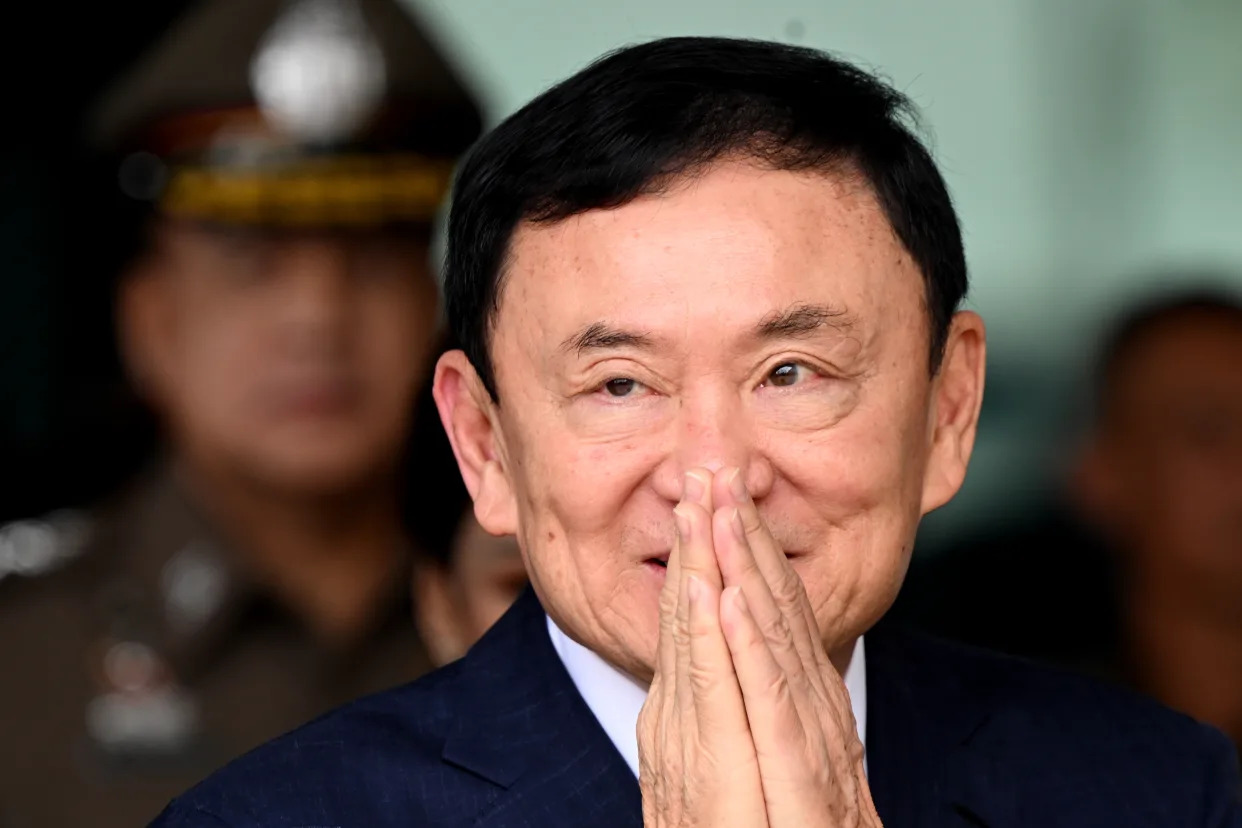
Thaksin Shinawatra arrives at Don Mueang International Airport in Bangkok on August 22, 2023. Credit - Sirachai Arunrugstichai—Getty Images
For more than 15 years, one man’s shadow has loomed over Thailand from afar. Billionaire former Prime Minister Thaksin Shinawatra may have lived in exile following his ouster in a 2006 coup d’état and subsequent corruption convictions, but the levers of power were never far from his grasp. Populist parties he backed had won every election since 2001 only to be repeatedly ousted by judicial and military coups—turmoil interspersed by bouts of often deadly street protests.
But Thaksin’s grip loosened following May’s general election, when his Pheu Thai party was bested by the upstart Move Forward Party, which secured 38% of the vote with its radical agenda to bridle the nation’s military and monarchy. Pheu Thai briefly allied with Move Forward, but after the coalition’s candidate for Prime Minister was rejected by the military-appointed Senate, the Thaksin proxy instead struck a deal with 10 establishment-leaning parties, including two directly responsible for his sister’s ouster in 2014.
At 9:25 a.m. on Tuesday, Thaksin returned to Thailand for the first time since 2008, arriving at Bangkok’s Don Mueang Airport wearing a navy blue suit and pink necktie. Posting on social media platform X, formerly Twitter, before his arrival, Thaksin said he wanted to “live on the land of Thailand and share the air with my Thai brothers and sisters.” He landed just hours before a scheduled parliamentary vote that looks likely to return a Pheu Thai candidate, property tycoon Srettha Thavisin, as Prime Minister. Pheu Thai insists that the timing of his return has nothing to do with the vote but was determined as auspicious according to astrological charts.
The truth is far less lofty. After two decades of battling the Thai establishment, urging fervent supporters onto the street and into often deadly confrontation with rivals and security forces, Thaksin has abandoned them to secure his return home. He was arrested after stepping off his private Gulfstream jet and transported to the Supreme Court and then to Bangkok Remand Prison, though nobody expects him to serve anything like the eight years that three of his in absentia convictions warrant. Rumors of a royal pardon continue to swirl.
That Thaksin did a deal with Thailand’s elite power nexus that effectively keeps the democratically elected Move Forward Party out of power has incensed many of his erstwhile supporters. While a raucous crowd of thousands greeted Thaksin at the terminal, social media is filled with outpourings of scorned former acolytes, some of whom have burned Pheu Thai shirts and banners in protest. Memories are seared deep of numerous bloody encounters with Thaksin’s new coalition bedfellows—not least the at least 90 Thaksin supporters killed in 2010 following a police crackdown on a protest in central Bangkok.
“Pheu Thai will pay a heavy price,” says Aim Sinpeng, a senior lecturer at the University of Sydney. “Because their stance for decades is that they're not going to be with the old elites, and now they are.”
It’s a cynical marriage of convenience between two camps that remain sworn enemies. But in Move Forward, the Thai elite found itself facing something far scarier than a brash, ambitious tycoon. If Thaksin tried to co-opt existing institutions for his own ends, Move Forward sought to upend them altogether, vowing to abolish Thailand’s controversial royal defamation law, military conscription, and its unelected Senate.
The resounding victory for Move Forward’s bold manifesto spooked the elites into doing a deal with their archnemesis. Thaksin, for his part, saw that his popularity would only wane further before the next election and, with Pheu Thai desperately running out of funds, it was essentially now or never. “It’s his last chance with Pheu Thai in shambles and his own credibility damaged,” says Napon Jatusripitak, a visiting fellow at the ISEAS-Yusof Ishak Institute in Singapore. “But his reputation as a pro-democracy figure has crumbled.”
It’s certainly a dark day for Thailand’s democracy movement, which was dancing in the street following Move Forward’s stunning victory. Since then, however, party leader Pita Limjaroenrat has been barred from serving as a lawmaker over allegations that he held shares in a defunct media company, contravening byzantine parliamentary rules. (He denies any wrongdoing). There are fears that he will be barred from politics and the party dissolved, just like its progenitor Future Forward Party, and various former iterations of Pheu Thai before.
At the very least, the hope is that the selection of a Prime Minister after three months of political limbo can get the country of 70 million back on track. GDP growth in Thailand slowed to just 0.2% in the second quarter of 2023, down from 1.7% in the previous. The tourism-reliant economy desperately needs stability and leadership.
As for democracy, thanks to Thaksin, the wait goes on.
“We're sick and tired of these shenanigans,” says Thitinan Pongsudhirak, professor of political science at Chulalongkorn University in Bangkok. “We want to have a democratically elected government moving the country forward. And Thaksin now is an obstacle.”
Thaksin Shinawatra: Former Thailand PM jailed after return from exile
Jonathan Head - BBC News, Bangkok
Tue, August 22, 2023
Thailand's former PM Thaksin Shinawatra has been jailed upon returning to the country after 15 years in exile.
But many believe he has struck a deal that will keep him from serving more than a short period in prison.
He arrived in Bangkok on Tuesday morning in a private jet, hours before his Pheu Thai party's candidate Srettha Thavisin was voted the next Thai PM.
This cements Pheu Thai's coalition with its former military rivals who deposed the party in 2014 in a coup.
Mr Thaksin, Thailand's most successful elected leader, has long been feared by conservative royalists, who have backed military coups and contentious court cases to weaken him. He went into self-imposed exile in 2009 after being deposed by a coup two years earlier.
While he made no secret of his yearning to be back in Thailand, what kept him away so long was the various criminal cases hanging over him. But now the brash, politically ambitious telecoms tycoon is back - and was almost immediately sentenced to eight years' jail on criminal convictions he says are politically motivated.
He arrived to cheers from hundreds of loyal "red shirt" supporters who had gathered overnight to see him, but he never greeted most of them.
Samniang Kongpolparn, 63, was among those who had travelled from Surin province in the northeast, the stronghold of Mr Thaksin's party in past decades.
"He's the best prime minister we've ever had. Even though I won't get to see him today, I still wanted to come to show him support," she said. "I'm ok with them reconciling with the pro-military government, or else we're stuck with the senators. We don't want that."
Who is Thaksin Shinawatra?
Flanked by his two daughters and son, Mr Thaksin emerged briefly from the airport terminal and paid his respects to a portrait of the king and queen. The 74-year-old was then taken to the Supreme Court where he was sentenced and then to Bangkok Remand Prison.
It has been speculated that Thaksin will seek a royal pardon, and prison authorities on Tuesday said he would be able to submit a petition from jail immediately. The process can take one to two months.
Prison authorities there say he will be kept in a wing with specific medical equipment, given his advanced age. He will also immediately undergo a 10-day quarantine - the first five days of which he will be confined to his room, authorities said.
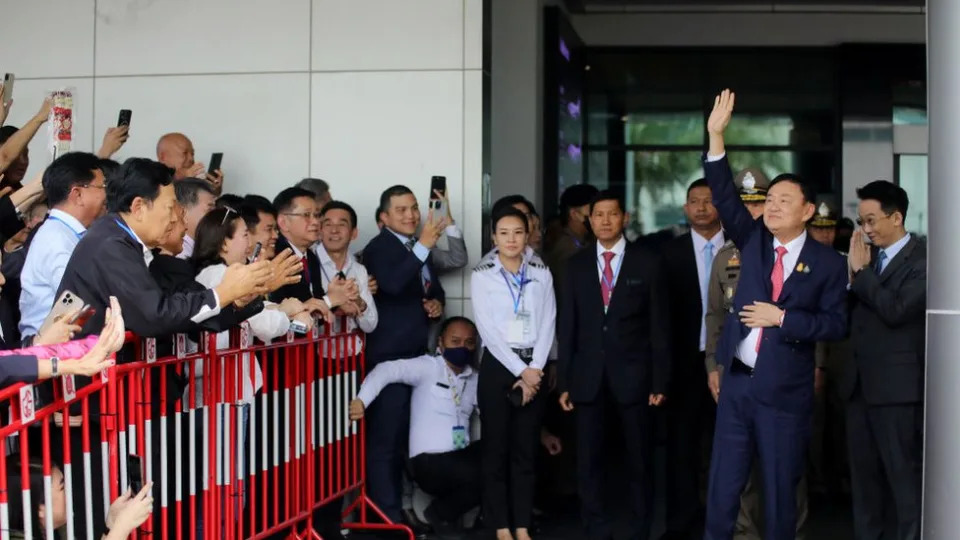
Mr Thaksin greets supporters after arriving in Bangkok
Thaksin's political party in the front seat
Mr Srettha's win on Tuesday is the result of a byzantine process which in three months has taken Thailand full circle.
It began with the heady hopes of a new dawn led by the radical young Move Forward party, which won the most seats in the May election.
Move Forward initially formed a partnership with Pheu Thai but the coalition now includes almost everyone but the reformers, including two parties led by former coup-makers - a deal with its sworn enemies that Pheu Thai vowed it would not do.
Pheu Thai insists the two developments - Mr Thaksin's return and the coalition that voted for a Pheu Thai PM - are unconnected. Few people believe that.
The party they can't stop winning in Thailand
Thai voters deliver stunning blow to army-backed rule
It is true that Pheu Thai's hands have been tied by the unelected senate, a 250-seat constitutional landmine planted in Thailand's political landscape by the military junta which ruled for five years after a 2014 coup.
And Pheu Thai's bargaining position was weakened by its poorer-than-expected performance in the election, when it lost a lot of support to Move Forward and for the first time was relegated to second place.
The senators, all appointed under the junta, are allowed to join the 500 elected MPs in voting for the new prime minister. Their thinly-disguised remit is to block any party which might threaten the status quo - the nexus of monarchy, military and big business which has dominated decision-making in Thailand for decades.
Unsurprisingly they refused to back the Move Forward-led coalition with Pheu Thai, despite its commanding majority in the lower house. When it was Pheu Thai's turn to negotiate a new coalition, its need for senate support meant it had to take in some of its former opponents.
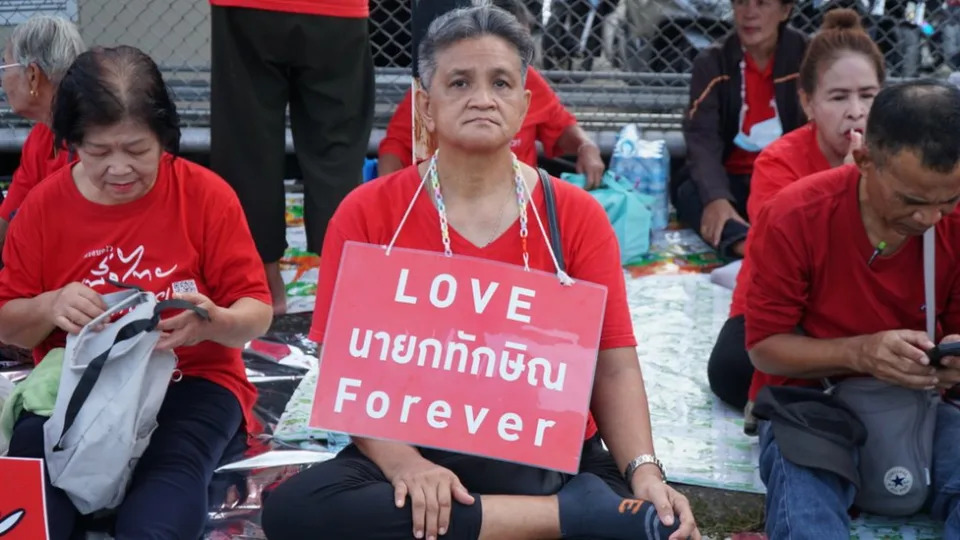
Many of the supporters had come from the northeast, a Thaksin stronghold
However some Pheu Thai politicians argue that the party should have held out for a better deal, by refusing to be in a government with the most hard-line conservative groups. Any minority administration formed without Pheu Thai and Move Forward would quickly collapse, because the senators cannot join normal parliamentary votes on issues like the budget.
But the Pheu Thai leadership was not willing to wait. It even invited the ultra-royalist party United Thai Nation to join the coalition, whose leaders have in the past been virulently critical of the Shinawatra family and their supporters. They were instrumental in ousting the last Pheu Thai government led by Mr Thaksin's sister Yingluck. That these two factions will now sit together in the same government is a mark of how far Thai politics has shifted.
In the end, for the ultra-royalists, the perceived threat posed by Move Forward, and by a younger generation of Thais demanding a conversation about the power and wealth of the monarchy, eclipsed their long feud with the Shinawatra family.
For the Shinawatras, and Pheu Thai's more conservative, business-minded elements, getting into government again and guaranteeing the deal to bring Mr Thaksin back, have been bigger priorities than worrying about the party's reputation.
But there are those, even within Pheu Thai, who are horrified by the cynical pragmatism of this deal.
They are warning that the party will lose even more of its once-passionate grass-roots supporters - and lose, perhaps forever, the dominance it held over electoral politics in Thailand for two decades.
New Thai leader Srettha Thavisin is a wealthy property developer who didn't hide his political views
JINTAMAS SAKSORNCHAI
Tue, August 22, 2023
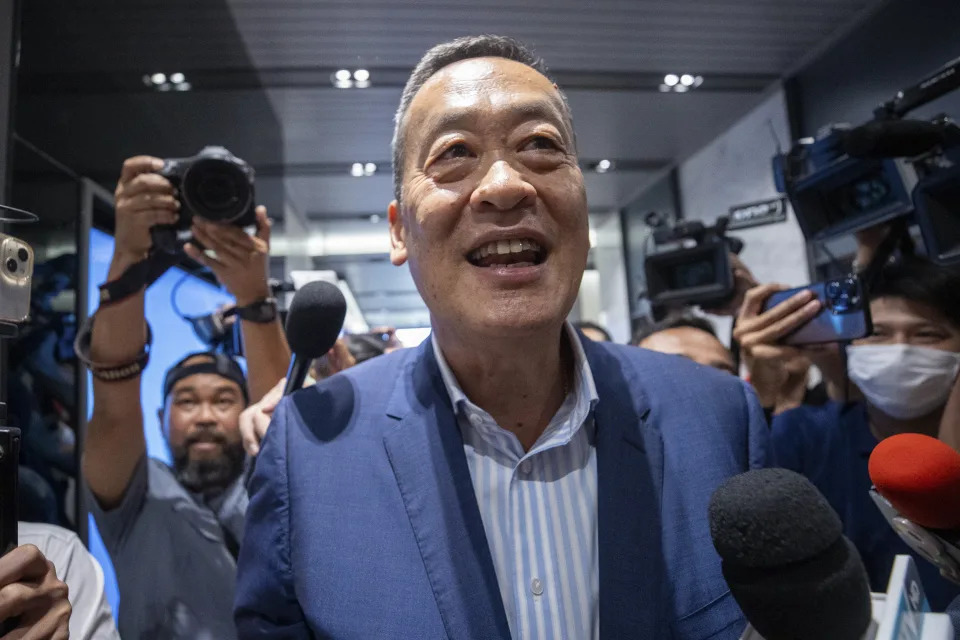
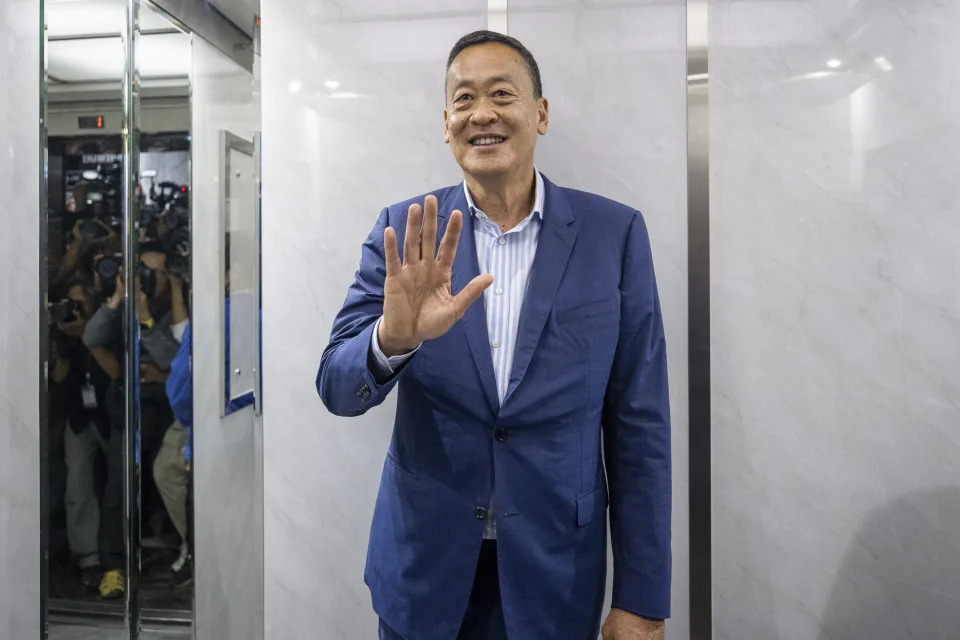
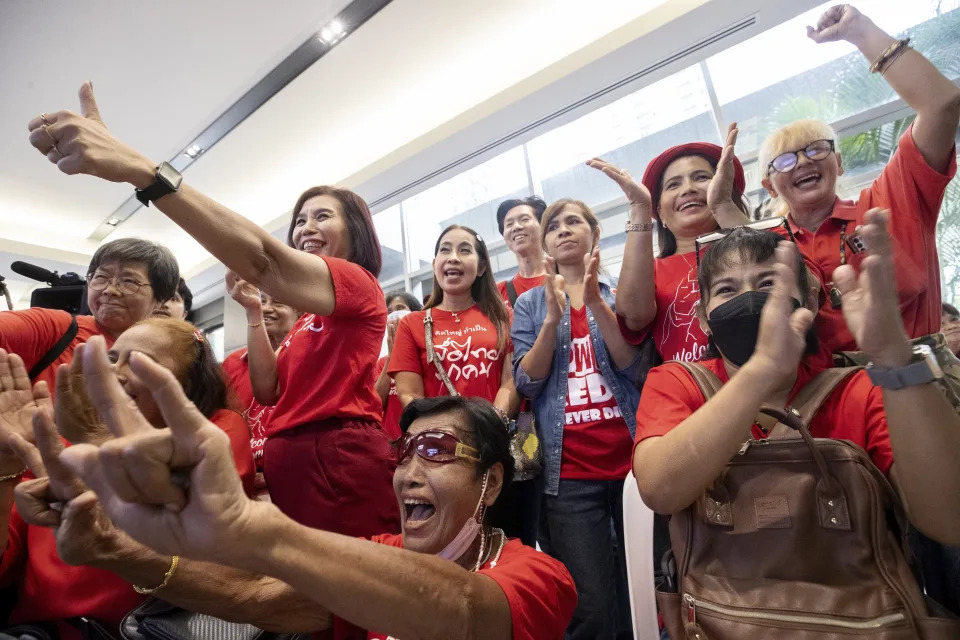
Pheu Thai supporters react during a parliamentary vote on Srettha Thavisin's prime ministerial candidacy, at the party headquarters in Bangkok, Thailand, Tuesday, Aug. 22, 2023.
BANGKOK (AP) — The leader of one of Thailand's best-known property empires has been selected prime minister just nine months after joining a political party that champions the poor.
Parliament confirmed Srettha Thavisin on Tuesday, ending months of political uncertainty following May elections. The 61-year-old political newcomer, who exudes the confidence of a seasoned business tycoon, will lead the Pheu Thai party's push to stimulate the economy and bridge one of the world's worst inequality gaps.
“I’m doing this because I want to improve the country and the economy," Srettha wrote on X, formerly known as Twitter, days ahead of the vote. "I’d like to emphasize again. My enemy is people’s poverty and inequality. My goal is a better livelihood for all Thai people.”
Srettha announced last November that he had joined Pheu Thai, the latest in a string of parties associated with popular but divisive former Prime Minister Thaksin Shinawatra, who was ousted by a military coup in 2006. It was Srettha's first official step into politics.
Hours before Tuesday's parliamentary vote, Thaksin returned to Thailand from years of self-imposed exile and began serving an eight-year prison sentence on corruption charges he has dismissed as politically motivated. There has been widespread speculation that Srettha’s expected appointment was related to Thaksin's return and that it might help shorten his jail time.
Early this year, Srettha stepped down as CEO and president of his family’s company, Sansiri, one of Thailand’s largest property developers with assets worth over 100 billion baht ($2.9 billion). He also transferred all of his shares, reportedly valued at more than 1.2 billion baht ($35 million), in the company to his daughter.
The recipient of an MBA from Claremont Graduate University in the U.S., Srettha led Sansiri to a record profit of over 4 billion baht ($117 million) in 2022.
After Pheu Thai confirmed it would nominate him as prime minister, Srettha and Sansiri battled a series of accusations of tax evasion and money laundering. The company and its former boss denied any wrongdoing.
Pheu Thai finished second in the May elections but was able to assemble an 11-party coalition — including two pro-military parties affiliated with outgoing Prime Minister Prayuth Chan-ocha — with enough parliamentary votes to approve Srettha.
Srettha was born into a wealthy family, and there has been skepticism over his ability to connect with Pheu Thai’s main voters in the country's relatively poor, rural north. After joining the party, he appeared at many campaign stops targeting the working class, including residents of Bangkok’s biggest slum community and rural farmers.
He became an adviser for Pheu Thai’s economic team and helped promote the party’s policies, including a plan to give 10,000 baht ($290) in digital money to all Thais age 16 and above, which created a major buzz.
Before starting his political career, Srettha was a high-profile critic of the outgoing government headed by Prayuth, who as army commander staged a coup that toppled a Pheu Thai government led by Thaksin’s sister Yingluck in 2014 and who returned as prime minister after a 2019 election. Srettha was among dozens of opposition politicians, academics and activists who were summoned by Prayuth’s junta for interrogation shortly after the coup.
Srettha wrote many online posts accusing Prayuth and his Cabinet of failing to effectively handle the COVID-19 pandemic. Combined with his support for student-led protests demanding democratic reforms in 2020, he earned a throng of followers who admired his views.
In an interview with Forbes Thailand last year, published just days before he formally announced his membership in Pheu Thai, Srettha said he believes big businesses and billionaires should contribute more to society to reduce inequality. He said he wants to inspire young people to help strengthen Thailand’s competitiveness with other countries.
Lisa MARTIN
Tue, August 22, 2023
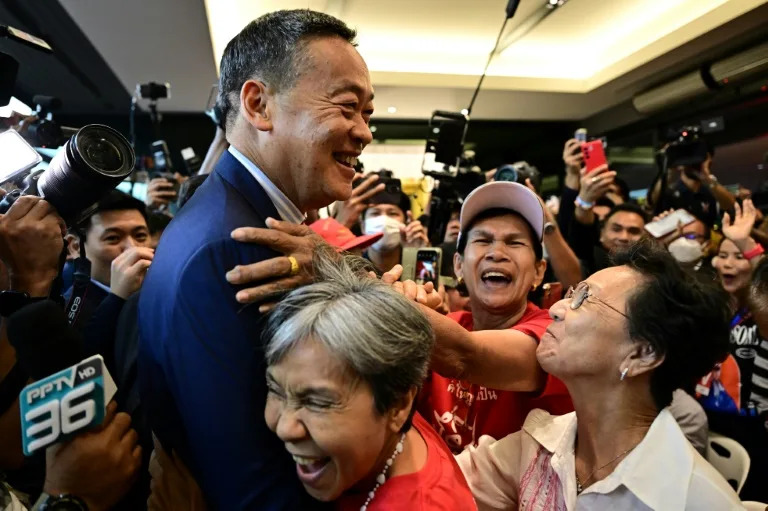
Property mogul and football fan Srettha Thavisin was approved by lawmakers as Thailand's new prime minister after months of political deadlock
Srettha Thavisin's confirmation as Thailand's 30th prime minister caps a swift and unexpected journey from the boardroom to the summit of political power.
Having helmed one of the kingdom's biggest real estate developers, the 61-year-old traded in his business suits for campaign trail casual wear when the Pheu Thai party named him as one of their three candidates for the top job.
The respect with which he is held by Thailand's powerful business community has sparked hopes he might kick-start the sluggish economy after a decade of drift under military-backed governments.
Srettha studied in the United States and entered politics having built fabulous wealth after heading one of Thailand's largest property firms, Sansiri.
His towering 1.90-metre (six-feet-three) frame was hard to miss during campaigning for the May election, although he cut a rather less glamorous and energetic figure than his fellow Pheu Thai candidate Paetongtarn Shinawatra, the daughter of ex-PM Thaksin Shinawatra.
Srettha sought out younger Thais with messages of education reform, LGBTQ rights, environmental protection, and measures to address Thailand's yawning inequality.
A dedicated Liverpool fan, he used TikTok to demonstrate his football skills, telling voters: "In football and politics... people cannot play alone, you have to play as a team."
His real estate firm diversified in 2017 into hospitality, tech and lifestyle businesses, spending some $80 million investing in boutique hotel chain Standard International, luxury magazine Monocle and other ventures.
Being associated with a number of "hip young brands" strengthened his appeal to a younger generation, Bangkok food and travel writer Vincent Vichit-Vadakan, who has chronicled Srettha's business career, told AFP.
"He can say he's hanging out with cool kids."
His relatively recent move into politics means he will likely struggle to impose his will on Pheu Thai, a party still seen as a vehicle for the Shinawatra clan.
He lacks "a direct base within the party", analyst Thitinan Pongsudhirak told AFP.
"That weakens his standing... he will be tested from the outset," he said.
Thitinan said the party's "old boys' network" would have its own agenda and Srettha's success depended on whether he could marshal his own support.
"What will be interesting is to what extent Srettha will be able to bring in his own people," he said.
Srettha's rise to prime minister came after junta-appointed senators rejected Pita Limjaroenrat, whose Move Forward Party (MFP) won the most seats in May.
Pita's pledges to reform royal defamation laws and tackle powerful business monopolies spooked the kingdom's conservative elite.
Pheu Thai then forged a new coalition without MFP, allying with army-backed parties. The sober businessman in Srettha -- who is married with three adult children -- was then seen as more palatable to the establishment.
The Thai stock market reacted favourably to his election, rising nearly 20 points, while Sansiri shares were up almost 7.5 percent.
bur-lpm/pdw/pbt
Patpicha Tanakasempipat, Suttinee Yuvejwattana and Anuchit Nguyen
Tue, August 22, 2023
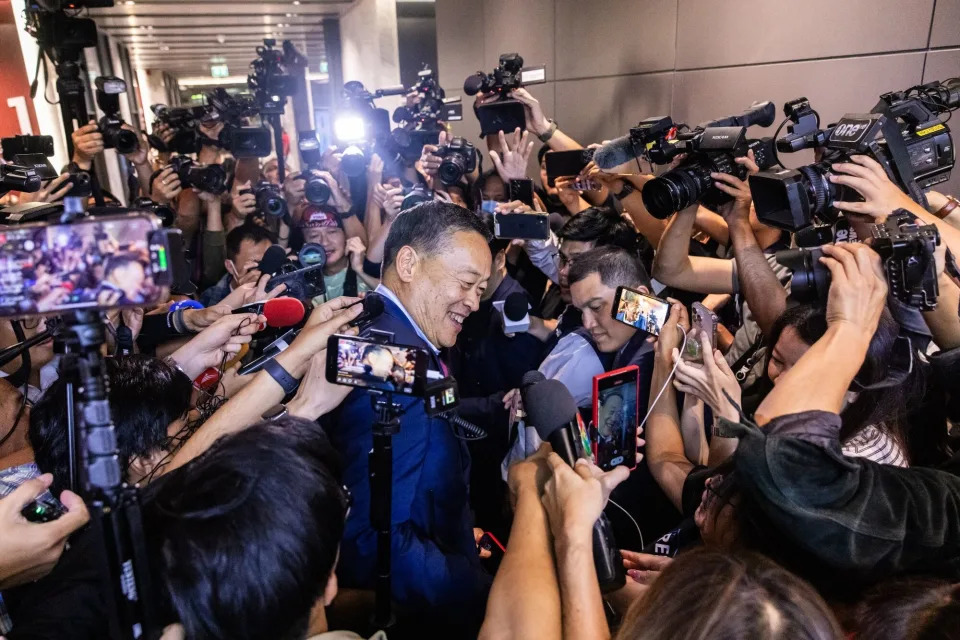
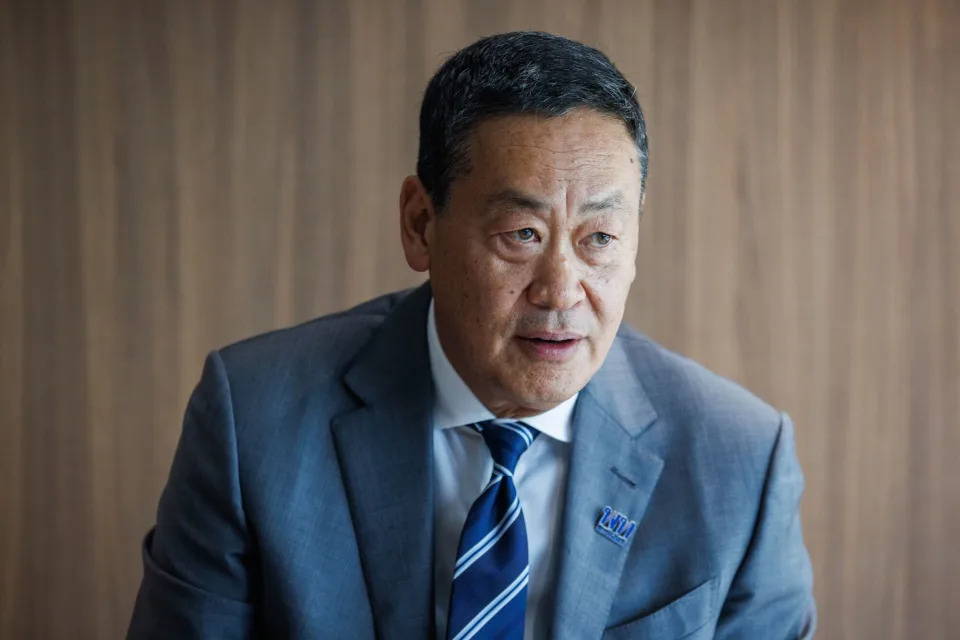
(Bloomberg) -- Some three months after an election that represented one of the biggest challenges in years to Thailand’s royal establishment, the country finally has a new prime minister — and it’s someone who has the support of forces aligned with the palace.
Srettha Thavisin, a former property tycoon, became the first new leader to take charge of Thailand since 2014, when former army chief Prayuth Chan-Ocha staged a coup. Srettha, 60, won at least 466 votes in a joint sitting of the parliament’s two chambers with 747 lawmakers on Tuesday, including 150 votes from the military-appointed Senate in addition to his bloc’s 314 elected lawmakers.
The vote came hours after Thaksin Shinawatra, a former premier who effectively helms Srettha’s Pheu Thai party, returned to Thailand for the first time in 15 years after cutting a deal with a military establishment that has repeatedly ousted his political allies over the past two decades. Pheu Thai had finished second to the upstart Move Forward party, which had pushed for changes to a law that restricts criticism of the nation’s powerful monarchy helmed by King Maha Vajiralongkorn.
The agreement between former enemies effectively shut the door on Move Forward from taking power. Pita Limjaroenrat, the party’s 42-year-old Harvard-educated leader, had vowed to press ahead with — a stance that prompted senators to deny him the premiership.
Thailand’s currency and stocks rallied on the news of Srettha’s election. The benchmark stock index jumped 1.3%, the biggest one-day gain since July 14, while the baht rose as much as 0.7%, the most in almost a month.
After landing in Thailand on Tuesday, Thaksin bowed before a portrait of the monarch to show his loyalty before being taken to prison to serve jail sentences for various cases stemming from his time as prime minister, which ended with a coup in 2006. He’s expected to receive a royal pardon at some point.
Red-clad supporters of Pheu Thai, who had thronged the airport to welcome back Thaksin, also celebrated Srettha’s win at the party headquarters in central Bangkok.
In the meantime, Srettha will look to move ahead with forming a cabinet among an 11-party alliance that can revive growth in Southeast Asia’s second-largest economy, which is among the nations growing at the slowest pace in the region. Investors, who have fled Thailand’s stocks since the May election, will be watching if Srettha follows through with his coalition’s promise to fire up the economy with cash handouts and a dose of fiscal stimulus.
“The new government will be positive for the economy,” said Amonthep Chawla, head of research at CIMB Thai Bank Pcl in Bangkok. “It will help improve sentiment and spur economic activities” through stimulus measures, he said.
Srettha is a three-decade veteran in the real estate industry with an MBA from Claremont Graduate School in the US. He joined Pheu Thai earlier this year, first taking the role of being the chief adviser to Thaksin’s daughter Paetongtarn Shinawatra before being named as one of the three premier candidates.
An avid soccer player and a fan of Liverpool FC in the English Premier League, Srettha led Bangkok-based Sansiri Pcl for decades before resigning as president and chief executive in April.
In an interview with Bloomberg earlier this year, Srettha said he wants to stimulate the economy that’s lagging the growth of its neighbors and bridge the gap between the rich and the poor. He was the one to unveil Pheu Thai’s “digital wallet” scheme that would give every Thai who is 16 years old and above 10,000 baht each.
The new prime minister will also have to follow through with Pheu Thai’s campaign pledges such as a 70% hike in minimum wage, household income guarantee of 20,000 baht per month and tripling of farm profits to lift economic growth to 5%.
Data Monday showed gross domestic product grew 1.8% in the second quarter, missing analysts estimate for a 3% growth and prompting authorities to slash the 2023 forecast to a range of 2.5% to 3% from 2.7%-3.7% seen previously.
The $500 billion trade- and tourism-reliant economy faces headwinds from a slowdown in China, which has hurt Thai exports, and also a slow return of Chinese tourists.
--With assistance from Pathom Sangwongwanich
Martin Petty
Updated Mon, August 21, 2023
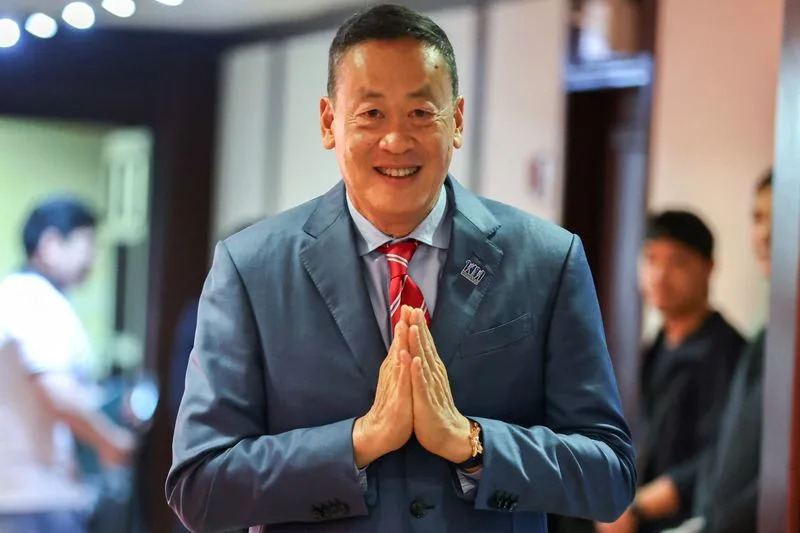
Thai PM hopeful Srettha says alliance with military parties a necessary path
By Martin Petty
BANGKOK (Reuters) - Thailand's Pheu Thai Party will attempt to form a government on Tuesday after weeks of post-election deadlock, with real estate tycoon Srettha Thavisin set to be nominated as prime minister and face a vote in parliament.
WHO IS SRETTHA?
Srettha, 60, is an outsider and political neophyte little known beyond Thailand. He joined the populist Pheu Thai in 2022 and up until the May 14 election was president of property developer Sansiri. He is not a member of parliament.
The six feet, 3 inch (1.92 m) tall Srettha is a finance graduate from the Claremont Graduate School in the United States who once worked for Procter & Gamble in Thailand.
Though he has no experience in government, his political ascent has been largely welcomed by businesses and he is untainted by the bitter power struggles that have dogged Thai politics for nearly two decades.
WHY IS HE BEING NOMINATED FOR PM?
Pheu Thai came a close second in the election but its pact with the winner, the progressive Move Forward, fell through after that party's prime ministerial candidate Pita Limjaroenrat failed to win support from lawmakers allied with the royalist military. Pheu Thai is now leading the effort to form a government.
The billionaire Shinawatra family that founded Pheu Thai has a long and bitter history with the military, which ousted the governments of Thaksin Shinawatra and his sister, Yingluck Shinawatra, in 2006 and 2014 respectively.
Thaksin's youngest daughter, Paetongtarn, was another possible candidate for prime minister. But to Pheu Thai's rivals, newcomer Srettha could be a more palatable compromise than having another Shinawatra at the helm.
DOES SRETTHA HAVE PARLIAMENT'S BACKING?
Fourteen parties have pledged support for Srettha and Pheu Thai in the lower house, but the biggest stumbling block will be the upper house Senate, whose 249 members were appointed by the generals who toppled Pheu Thai's last government.
The military created the rules under which a prime minister is selected, with the Senate essentially protecting establishment interests by serving as a bulwark against elected progressive politicians.
The Senate's largely conservative members were instrumental in ensuring Move Forward's Pita failed and it is unclear how many will see Srettha and Pheu Thai as a better option.
Srettha needs 375 votes, or more than half of the combined lower and upper houses. Pheu Thai's alliance has 11 parties with a combined 314 seats, and three more lower-house lawmakers backing it, so it needs the votes of 58 Senators.
WHAT'S DIFFERENT THIS TIME?
The military-backed United Thai Nation and Palang Pracharat parties that were instrumental in thwarting Move Forward have joined the alliance backing Srettha.
But scepticism remains about how firm that support is, given the army's years-long efforts to undermine Pheu Thai. To have such backing from its enemies indicates some kind of once unthinkable power-sharing agreement may have been made behind the scenes.
That would boost Srettha's chances of winning the backing of Senators allied with the army.
However, given the fraught history, there will be doubts about the effectiveness of such a coalition, how long a Pheu Thai-led government might last, and whether the military and allies in key institutions might try to push Pheu Thai out later.
An opinion poll published on the weekend showed many Thais were not happy with the idea of a Pheu Thai-military pact.
WHAT ROLE IS THAKSIN SHINAWATRA PLAYING?
Officially, none, but as the self-exiled figurehead of the Pheu Thai political juggernaut, it is almost certain Thaksin would have been involved in any deal made between rival camps.
Thaksin, 74, is a fugitive in Thailand and plans to return on Tuesday, the same day as the vote, after 17 years abroad dodging jail sentences handed down in absentia for abuse of power and more.
The change of heart suggests Thaksin is confident the vote will go in Pheu Thai's way and any deal he has with old enemies will hold - including over his incarceration - despite the history of mistrust and betrayal. Some people in Thailand, however, are sceptical about Thaksin's promised homecoming and see it as political theatre.
AFP
Tue, August 22, 2023
Former Thai leader Thaksin Shinawatra returned from 15 years in exile on Tuesday and was immediately jailed, but his time behind bars could be cut short with his party on the cusp of winning back power.
The divisive billionaire landed in a private jet at Bangkok's Don Mueang airport at 9 am (0200 GMT), to be greeted by hundreds of noisy "Red Shirt" supporters waving banners and singing songs.
Thaksin, 74, emerged briefly from the terminal building to bow and offer a floral garland at a portrait of King Maha Vajiralongkorn as a mark of respect before waving to supporters.
More Red Shirts lined the streets as the former Manchester City owner was taken to the Supreme Court.
There, he was ordered to serve eight years for three convictions passed in his absence -- one linked to his former Shin Corp company, another linked to a bank loan, and a lottery case.
But it was unclear how long Thaksin would stay in jail.
His return came just hours before parliament was expected to install business tycoon Srettha Thavisin as prime minister at the head of a coalition led by the Pheu Thai party -- the latest incarnation of Thaksin's political movement.
The timing of Thaksin's return, with his party on the verge of assuming power, has led many to speculate that a backroom deal has been done to allow him leniency.
- Loved and loathed -
Thaksin has said he was willing to face justice in order to return home and see his grandchildren -- though he has long maintained the criminal charges against him are politically motivated.
"I would like to request permission to return to live on Thai soil and share the air with my fellow Thai brothers and sisters," he posted Monday on Twitter, which has been rebranded as X.
For all his long absence from the country, Thaksin remains Thailand's most influential -- and controversial -- politician of modern times.
His career has included two election victories, defeat in a coup, criminal charges and the long years of self-imposed exile.
Loved by the rural poor for policies including cheap healthcare and the minimum wage, he is reviled by the pro-military and royalist elite who saw his rule as corrupt, authoritarian and a threat to Thai social order.
Parties linked to Thaksin have dominated elections since 2001 -- until this year, when the progressive Move Forward Party (MFP) won the most seats.
Hundreds of Red Shirts waited through the night at the airport to welcome him with songs and banners -- most decked out in their usual crimson colours.
"I am a real Red Shirt -- whenever they want our support, I will always be there for them," Karuna Wantang, 70, a retired bureaucrat from Nongkai, in the country's northeast, told AFP.
"I don't only like him but I love him."
The Department of Corrections said Thaksin had been isolated in prison because of health problems, including heart and lung complaints, but his family would be able to visit him after five days.
Asked about the possibility of a royal pardon, the deputy director of the Department of Corrections Sithi Suthiwong told reporters the process took "about one to two months, if the documents are sufficient".
"Relevant parties can apply for the royal pardon procedure. We will hand it to the justice minister and then the prime minister passes it to the Privy Council," he said.
- PM vote -
While Thaksin was being processed by the courts, his party formally nominated Srettha as its PM candidate in parliament, where a confirmation vote will be held around 3 pm.
MFP beat Pheu Thai into second place in May's polls.
But MFP leader Pita Limjaroenrat saw his bid to become PM sunk by conservative junta-appointed senators, who were spooked by his party's determination to reform royal insult laws and tackle business monopolies.
After MFP dropped out, Pheu Thai cooked up a controversial coalition of a dozen parties including those of former coup-makers who ousted Thaksin's sister Yingluck as PM in 2014.
The partnership has outraged many Pheu Thai supporters and Aaron Connelly, a Southeast Asian politics expert at the International Institute for Strategic Studies said the party would expect a payoff.
"If he (Thaksin) doesn't receive a royal pardon within a certain amount of time then they might begin to question whether they entered a coalition under false pretences," he told AFP.
bur-pdw/qan
Thaksin Return From Exile Shows Thai Royalists Have Bigger Enemy
Patpicha Tanakasempipat
Mon, August 21, 2023
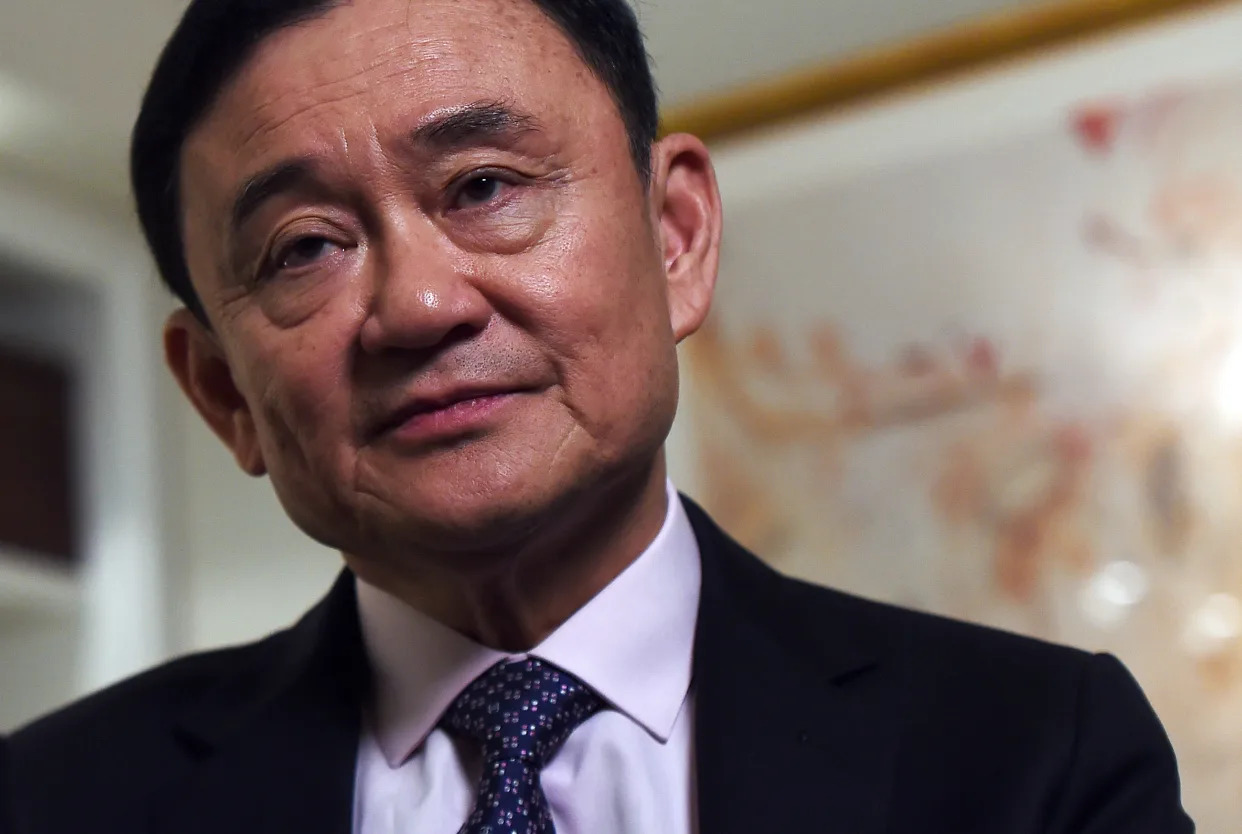
(Bloomberg) -- Back in 2008, the last time Thaksin Shinawatra stepped foot in Thailand, he was adored among the nation’s poorer masses and widely despised by the royalist elite who backed his removal in a coup two years earlier.
On Tuesday, Thaksin is expected to return to Thailand — ostensibly after making a deal with the same military-backed establishment that spent years overturning his party’s election victories through coups and court decisions.
“Tomorrow at 9 o’clock I would like to request permission to return to live in Thailand and breathe the same air as the Thai brothers and sisters,” Thaksin said on X on Monday. Last week, his daughter Paetongtarn Shinawatra said he would arrive at Bangkok’s Don Mueang airport at 9 a.m.
Thaksin’s arrival will coincide with a vote for prime minister later in the day, after his party officially joined forces with conservative groups previously aligned with former Prime Minister Prayuth Chan-Ocha, a former army chief who had led a 2014 coup against ex-leader Yingluck Shinawatra, Thaksin’s sister. The bloc’s candidate to become prime minister is Srettha Thavisin, a member of the Thaksin-backed Pheu Thai party who spent years in the real estate industry.
The awkward 11-party alliance emerged after both camps saw their interests align in the wake of a May election that produced a stunning win for Move Forward, a party that advocated changes to a law forbidding criticism of King Maha Vajiralongkorn and other top royals. The royalist parties wanted to keep Move Forward out of power, while Thaksin sought to strike a deal that would allow him to return to Thailand after 15 years of shuttling between Hong Kong, Singapore, Dubai and London.
“Pheu Thai is the most powerful party to battle the emergence of Move Forward, after the electoral defeat of the conservative parties,” said Yuttaporn Issarachai, a political scientist at Sukhothai Thammathirat Open University. “As the saying goes, the enemy of my enemy is my friend.”
Political Drama
Thaksin’s return will mark a full-circle moment in Thailand’s political drama, which has seen a cycle of coups and deadly street protests erodes the nation’s competitiveness as a Southeast Asian manufacturing destination since the turn of the century. Foreign investors have dumped about $3.8 billion of Thai stocks this year, triggering an almost 9% slump in the main stock index to rank it among Asia’s worst performers.
It’s unclear how much Thailand’s outlook will change after a new government is formed, assuming the coalition doesn’t fall apart at the last minute. On Monday, the group pledged a mix of cash handouts and fiscal measures to stimulate an economy that expanded 1.8% in the second quarter, well below a consensus forecast of 3% growth.
Thaksin himself will likely head straight to jail, as he was found guilty in absentia in four corruption cases and still faces 10 years in prison. The Bangkok Post reported that Thaksin would be taken to the Supreme Court immediately after landing, after which he would be taken to prison.
In May, he said he would go through the judicial process and also asked for permission to return, without providing more details on the request. King Maha Vajiralongkorn has the power to pardon any criminals.
“It’s all my own decision for the love and bond I have for my family, homeland, and our master,” Thaksin said at the time.
Thaksin, a former telecom billionaire, first rose to power in 2001 after pledging to revive Thai growth in the wake of the Asian financial crisis and help poorer citizens with cheap healthcare and debt relief measures. His party won 75% of seats up for grabs in a 2005 election, spooking a royalist establishment that had allowed only limited democracy since Thailand abolished absolute monarchy in 1932.
Change of Guard
Thaksin was ousted in a coup the following year, kicking off a power struggle lasting almost two decades in which his political allies would win elections only to see unelected generals, bureaucrats and judges overturn them, using a variety of methods.
This year’s election, however, saw Pheu Thai finish in second place despite being led by Thaksin’s youngest daughter Paetongtarn, who turned 37 on Monday. That marked a changing of the guard, as younger Thais become more disillusioned with an establishment that has restricted democracy.
Suddenly the most popular politician in Thailand wasn’t affiliated with Thaksin. Harvard-educated Pita Limjaroenrat, 42, proved both more democratic and ideological, willing to talk about sensitive issues related to the monarchy — something Thaksin had always resisted.
The establishment quickly moved to block Pita from taking power, with the military-appointed Senate — mandated by a constitution written after the 2014 coup — preventing him from becoming prime minister. That paved the way for Thaksin’s Pheu Thai to cut a deal with the military, cementing his return and helping conservatives defuse what they perceive to be the biggest threat to the monarchy.
“This election has been about Thaksin from the beginning,” said Titipol Phakdeewanich, dean of political science at Ubon Ratchathani University. “His return will strengthen the conservative establishment that was already weakened by the election process. This will delay the democratic process in Thailand.”
(Updates with Bangkok Post report in ninth paragraph.)
Most Read from Bloomberg Businessweek












